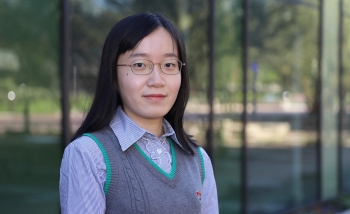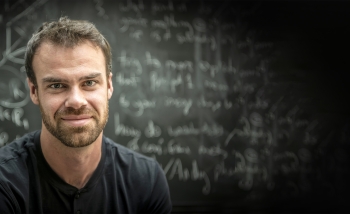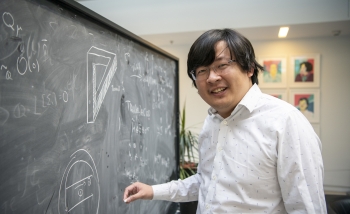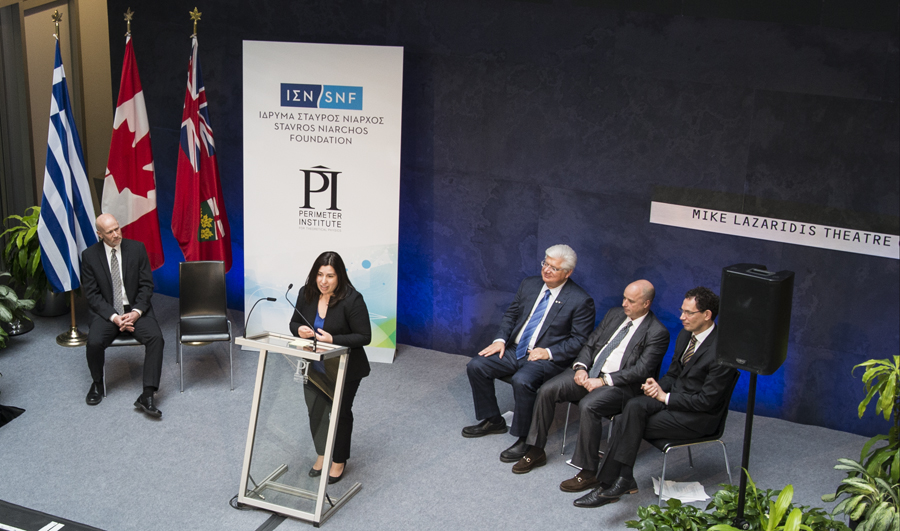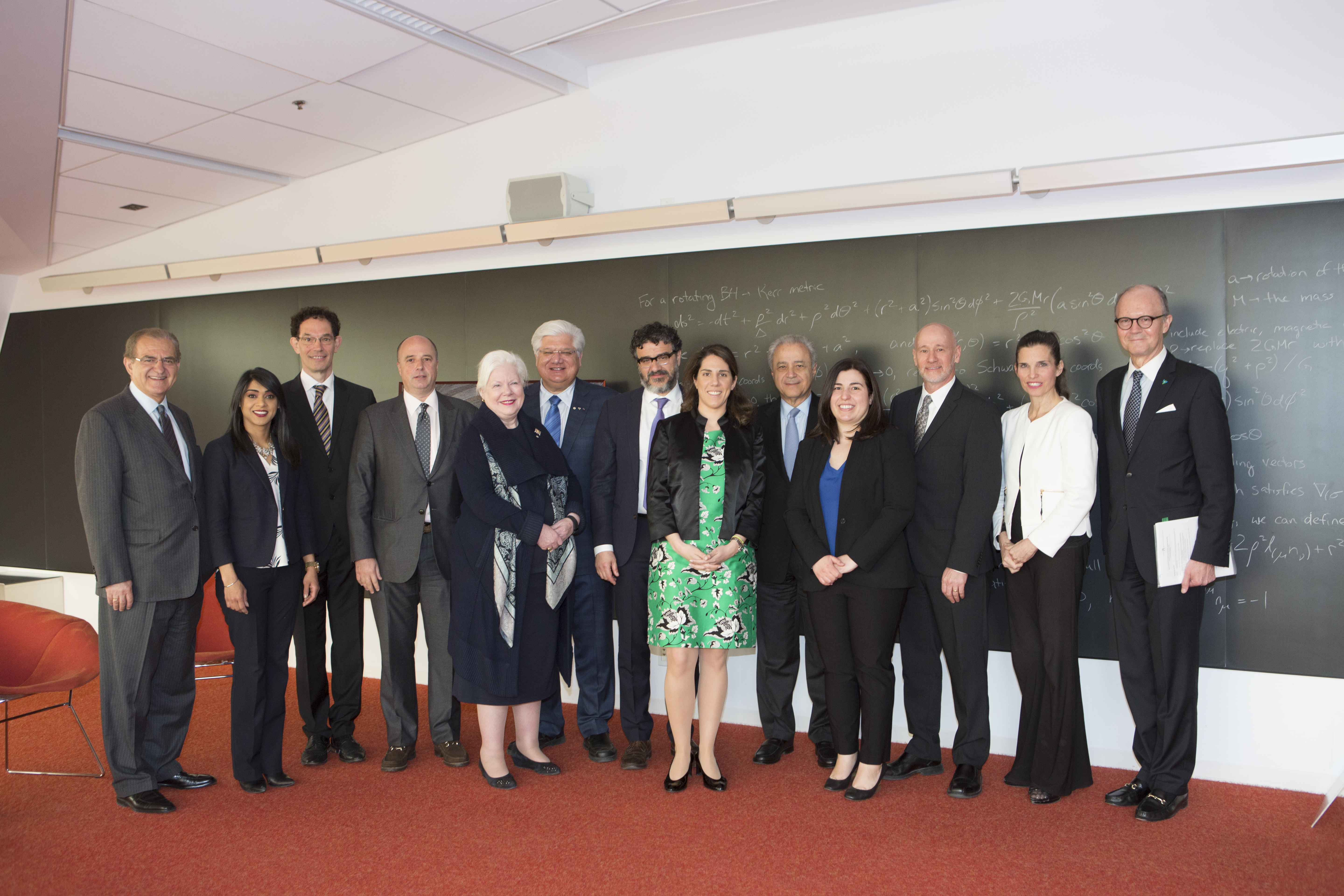Asimina Arvanitaki has been named the inaugural Stavros Niarchos Foundation Aristarchus Chair in Theoretical Physics at Perimeter Institute.
An $8 million investment, shared equally between the Stavros Niarchos Foundation and Perimeter Institute, will support pioneering research into the universe at its most fundamental level, as well as foster research and training ties between Perimeter Institute and Greece.
At a ceremony announcing the Chair today, Ontario’s Lieutenant Governor Elizabeth Dowdeswell praised both the new Chair and Perimeter’s overarching aim to enable breakthrough science.
“Scientific excellence is a noble goal,” Her Honour said. “The rigour that comes from developing and testing hypotheses, the discipline required to subject theory to hard data, and the exploration of the boundaries of human knowledge – that’s what scientific excellence is all about.”
Perimeter Director Neil Turok described Arvanitaki as an exceptional scientist, and an “unusual” particle physicist.
“We recruited Mina precisely because she is a very unusual particle physicist who is literally trying to bring in the next paradigm of theory testing, involving totally original experimental designs which will add to the knowledge that colliders can give us in completely new ways, specially employing highly precise quantum measurement technology,” Turok said.
“Thanks to this new investment from the Stavros Niarchos Foundation, Asimina will have opportunities to pursue breakthrough discoveries.”
Arvanitaki joined Perimeter Institute in 2014, after earning an undergraduate degree from the University of Athens and a PhD from Stanford University. Before starting at Perimeter, she was a research associate at the Stanford Institute for Theoretical Physics.
Arvanitaki has described her research as broad and interdisciplinary, testing theories that are beyond the Standard Model, including supersymmetry, dark matter, and extra dimensions.
Her Chair is named after Aristarchus, an ancient Greek mathematician and astronomer who proposed the first-known model placing the sun at the centre of the solar system.
“All I can say, as someone who comes from a small village in Greece, this is something I never dreamed of,” said Arvanitaki, who becomes the first woman to hold a research chair at Perimeter. “The only thing I can honestly say is thank you. Thank you for the privilege of making me part of the team that tries to help Greece in such a time of need.”
For Andreas Dracopoulos, the Co-President and Director of the Stavros Niarchos Foundation, Arvanitaki’s appointment does more than support fundamental discovery. It also serves as a beacon for Greek science students caught in the current economic crisis affecting his country.
“Although at first glance one might feel there is little in common, our two organizations share a lot. Both Perimeter and the Stavros Niarchos Foundation are not-for-profit organizations which share a mission: that of trying to improve society at large,” Dracopoulos said.
“Science owes so much to the art of imagination, or as Arvanitaki said in a recent interview: ‘If you don’t look, you don’t know.’ To all of you at the Perimeter Institute, keep imagining, keep looking, for the good of humankind.”
While much of the field of particle physics is concerned with the “high energy frontier,” which requires huge colliders to smash particles, Arvanitaki’s research focuses on tests at the so-called “precision frontier.” These tests seek to probe new physics with ultra high-precision measurements that can reveal new insights using experiments that are, in some cases, small enough to fit on a table top.
Using technologies and techniques from other fields of physics, Arvanitaki designs novel experiments that may provide insights into the nature of dark matter, particle interactions, and other deep questions. The new investment will enable collaboration between Arvanitaki and her research colleagues, the hiring of a research team, and more.
Arvanitaki’s science, determination, and passion will serve as inspiration to the next generation of young scientists, said Canada’s Minister of Science Kirsty Duncan, who was joined by Minister of Small Business and Tourism Bardish Chagger (MP-Waterloo).
“You are a tremendous credit to your chosen field, and to the Perimeter team,” said Minister Duncan. “May this important chair take you even further in your discoveries.”
ABOUT THE STAVROS NIARCHOS FOUNDATION
The Stavros Niarchos Foundation (www.SNF.org) is one of the world’s leading private international philanthropic organizations, making grants in the areas of arts and culture, education, health and sports, and social welfare.
The Foundation funds organizations and projects that are expected to achieve a broad, lasting, and positive impact for society at large, focusing on vulnerable groups such as children and the elderly, and also exhibit strong leadership and sound management. The Foundation also seeks actively to support projects that facilitate the formation of public-private partnerships as an effective means for serving public welfare.
Since 1996, the SNF has made grant commitments of $1.8 billion / €1.5 billion, through 3,316 grants to nonprofit organizations in 111 nations around the world.
About PI
Perimeter Institute is the world’s largest research hub devoted to theoretical physics. The independent Institute was founded in 1999 to foster breakthroughs in the fundamental understanding of our universe, from the smallest particles to the entire cosmos. Research at Perimeter is motivated by the understanding that fundamental science advances human knowledge and catalyzes innovation, and that today’s theoretical physics is tomorrow’s technology. Located in the Region of Waterloo, the not-for-profit Institute is a unique public-private endeavour, including the Governments of Ontario and Canada, that enables cutting-edge research, trains the next generation of scientific pioneers, and shares the power of physics through award-winning educational outreach and public engagement.
You might be interested in
